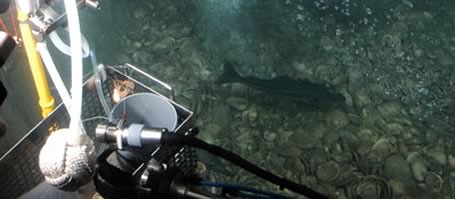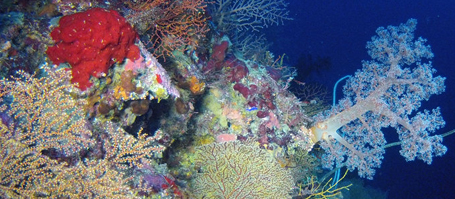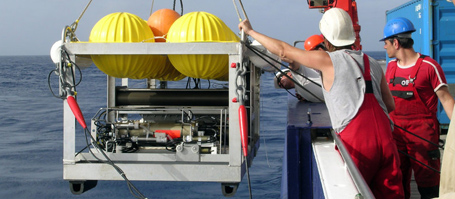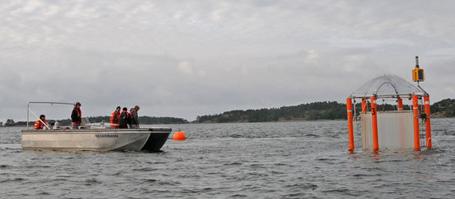The evacuation of the important drilling platform “Elgin” in the North Sea off the Scottish coast indicates that there must be an imminent threat. Gas has been escaping from a reservoir some 5500 meters deep uncontrollably for days and rising to the surface. The French company Total operating the the platform, stopped production and evacuated the workers. A neighboring platform was also evauated. They fear an explosion as well as environmental damage. Geologists and biologists from GEOMAR are trying to assess the situation.
The geologist Dr. Warner Brückmann and the biologist Dr. Peter Linke from GEOMAR both agree that this accident will have significant effects. “We know of a similar incident which occurred in the early 90s in the North Sea” reveals Dr. Linke. “A concentration layer rich in gas at 350 meters depth with a pressure of 50 bars was accidentally drilled and methane has been leaking ever since.” The platform was relocated just in time. However the dimensions of the Elgin case are much larger. The deposit lies at 5.500 meters (with a water depth of 90 meters) and the pressure was 1.100 bars at the beginning of the production. “Even though the pressure has clearly sunk, it is still much higher than the other case” says Warner Brückmann. The platform used to produce nine million tons of gas a day which is about 3% of the British gas production. “Moreover the escaping gas consists not only of methane but also of ethane, propane, hexane, carbon dioxide, and hydrogen sulfide” explains Dr. Linke. This means that the gas is not only explosive but also poisonous for numerous organisms. Dr. Linke assumes that the damage will only concern the immediate surroundings because the North Sea’s strong current causes the area to be well aerated. If the emission continues, however, larger areas will be affected. Because of the current, German coasts will not be affected.
Both scientists underline the fact that the data they have is not verified. In order to evaluate the situation properly, exact figures on the amount and configuration of the gas are needed, as well as detailed observations on the expansion of the water column and leakage into the atmosphere. “We have the necessary instruments and our detailed observations of the similar case in the southern part of the North Sea” states Dr. Linke. In the following week the research vessel ALKOR will be departing for the small gas leak to pick up long-term observations and to do some measurements. “Depending on the development of the leak, we might have the chance to look at the Elgin field in the summer” explains Peter Linke. This would only be possible if there is no further risk of explosion.
Summary of the scientist’s main points:
- It is still unclear what environmental damage will be caused, as vital information on the type and amount of the emission is missing.
- The environmental damage will most probably be far smaller than the damage cause by Deep Water Horizon in the Gulf of Mexico, since no oil is leaking, the North Sea is well aerated by the currents and there is a high water exchange with the North Atlantic (transportation of a few million cubic meters of water per second).
- German coastal waters will not be affected as the water is flowing towards Denmark/Norway.
- GEOMAR has the technology and the knowhow to quantify the emissions at the seabed, estimate the emissions into the atmosphere and analyze the effect on the environment. A trip to the North Sea is planned for August 2012, yet, if the possibility arises, measurements could also be made earlier.
Links:
Contact:
…



